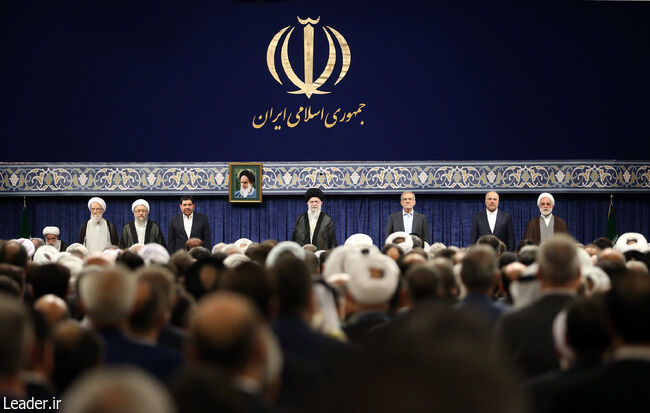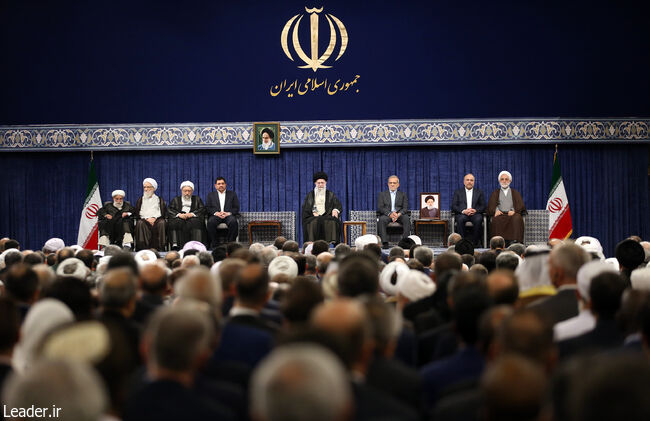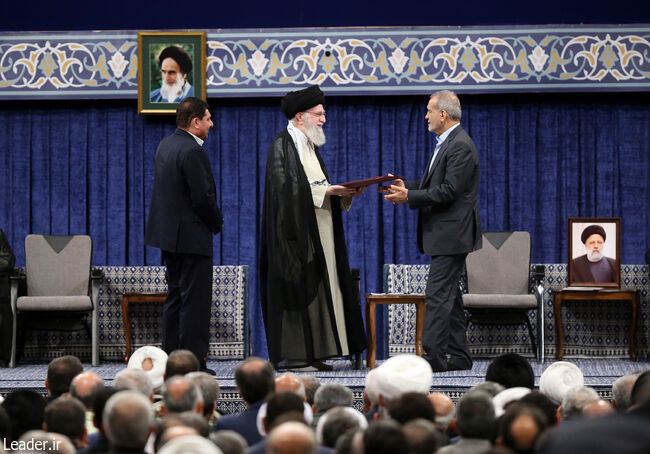This morning, in a ceremony attended by national and military officials, representatives from various sectors and professions, the families of martyrs, and resident ambassadors, the Leader of the Islamic Revolution, Ayatollah Khamenei, endorsed the Iranian people's vote for Dr Masoud Pezeshkian and appointed him as President of the Islamic Republic of Iran, based on Article 110, Clause 9 of the Constitution.
In the Decree of Endorsement, The Leader described the peaceful conduct of the 14th presidential election as a national honour and a reflection of the rationality and decorum of the country's political atmosphere. He praised the elected President as a wise, honest, popular, and scholarly individual.
The text of the endorsement decree, which was read by Hujjat al Islam wa al-Muslimin Muhammadi Golpayegani, is as follows:
In the Name of Allah, the Beneficent, the Merciful
All praise is due to Allah, Lord of the worlds. Peace and blessings be upon Muhammad and his pure family, especially the Awaited One among the worlds.
Thanks be to the Wise and Powerful Lord who has once again brought honour to Islamic Iran and illuminated the face of this great nation. Through the efforts of the people and officials, this pivotal presidential election was carried out with calm and dignity under challenging conditions, and the person chosen by the nation has been made ready to undertake a great responsibility.
Following the unfinished term of the late martyred President, the 14th presidential election is an honour for the Iranian nation and a sign of the stability of the Islamic system. It reflects the level-headedness and propriety of the country's political atmosphere. When we observe the undesirable occurrences in similar situations in other parts of the world, the presidential elections highlight the distinction of Iran and the Iranian people.
At this time, I would like to express my gratitude to all those who played a role in creating this honour. In accordance with the will of this great nation, I endorse their vote for the wise, honest, popular, and scholarly figure, Dr Masoud Pezeshkian, and appoint him as President of the Islamic Republic of Iran. With sincere prayers and wishes for his success, I would like us to remember that the people's vote and my endorsement will remain in effect if his conduct consistently aligns with the Straight Path of Islam and the Revolution.
And Peace be Upon the Righteous Servants of Allah.
Seyyid Ali Khamenei
July 28, 2024
After granting the Decree of Endorsement to Mr Pezeshkian at the ceremony, the Leader described the holding of the 14th election as a success for the nation in an important test. He expressed hope that the people would feel the gratifying results of the election and made important recommendations to the President, the incoming government, the people, and the supporters of the candidates.
Ayatollah Khamenei expressed his gratitude to the Divine Presence and described the endorsement ceremony as the final page of a substantive book in which the Iranian people and those involved in the 14th election have made a lasting contribution to the honour of the nation.
Referring to the public grief caused by the loss of the martyred President, he said, "Despite this, the election was conducted with calm, integrity, competition, and the commendable conduct of the candidates towards the elected President. We thank Mr Mokhber, the respected acting President, and the government team for their two months of efforts in this regard."
The Leader considered the democracy in the country, combined with competition and integrity, as the result of the nation's uprising and revolution in response to the dire conditions of the past. He added, "From the very first day of victory, the late Imam in an unprecedented move, decisively laid the foundations for the involvement, presence, and impact of the people in governing the country marking one of the most significant events in the nation's history."
Referring to the failed experience of the Constitutional Revolution, he said, "Despite the people's efforts, that experience was fruitless due to the lack of a powerful, influential, and popular leadership. Internal turmoil and foreign interference eventually led to the rise of a ruthless and harsh dictator named Reza Shah about 15 years later, and all the nation's efforts were in vain."
Ayatollah Khamenei described the dictatorship of the Pahlavi regime as characterised by: oppression of the people, pressure on the nation, and humiliation and obedience to foreigners. He added, "By bringing that person to power, the British plundered Iran's national resources and did whatever they wanted in the areas of politics, culture, economy, anti-religion, and anti-clericalism. Ultimately, they exiled and expelled their puppet due to his inclination towards Hitler's Germany and installed his unworthy son to continue the same policies."
He listed severe internal repression, humiliation by foreign policies, and permitting the plunder of national resources, including oil, as key characteristics of Mohammad Reza Pahlavi's rule. He added, "The actions of the second puppet reached a point where he resorted to a U.S.-British coup to overthrow a national government that had unprecedentedly come to power through the people's vote; this was an atrocity beyond imagination."
The Leader referred to the ongoing democracy in the country as the Revolution's gift to the nation and said, "In the past forty or so years, dozens of elections have been held with competition, integrity, and the enthusiastic participation of the people. While the level of participation has sometimes been higher and sometimes lower, the primary importance lies in the consistent motivation of the people, which has always been present."
Ayatollah Khamenei described the President's remarks at today's ceremony as well-founded, profound, and indicative of a commitment to the true principles of religious democracy. He added, "We hope that with the grace of God and everyone's support, the President and the forthcoming government will be able to accomplish great things for the nation and the country."
The Leader then presented seven important recommendations to the President, the government, and officials in various sectors.
In his first recommendation, he referred to the numerous natural and human resources of Iran and called on the new government to make use of these resources. He said, "There are many thoughtful and innovative individuals in the country whose proposals or critical ideas are often insightful and remarkable. The government and the esteemed President should utilise the approach of: 'for the people, with the people, and among the people' to leverage this immense potential in achieving their goals."
Ayatollah Khamenei added, "In addition to human resources, the country possesses numerous material and natural opportunities and wealth that have not yet been fully utilised. By relying on this array of opportunities, significant achievements can be made, provided there is a high level of determination, the serious pursuit of tasks, and the selection of competent partners."
The Leader dedicated his second recommendation to the importance of jihadi work and emphasised that with a jihadi spirit, mountains of problems can be moved. He added, "Jihadi work means working tirelessly and without reward or expectation and advancing with the goal of fulfilling human and divine duties."
He did not consider adherence to legal and administrative frameworks to be contrary to jihadi work, saying, "Many people appear to follow the law without achieving the desired results. However, jihadi work focuses on quality, just as great accomplishments, such as victory in the eight-year Sacred Defence and confronting the complex and diverse plots of enemies, were made possible through jihadi work."
Ayatollah Khamenei described Martyr Raisi as someone dedicated to jihadi work and noted, "He truly did not distinguish between day and night for work and effort, and he did not seek praise or commendation from others for his numerous accomplishments."
He stated that a prerequisite for jihadi work is the presence of officials in the field and avoiding remote management, saying, "It is not possible for a manager to control tasks from afar; they must be directly involved in the job."
In his next recommendation, the Leader emphasised the necessity of "interaction among the different levels of government in the country." He said, "The Parliament should assist the government, and the government should be attentive to the subtleties of the Parliament. The Judiciary should also have an active presence wherever needed."
Referring to his recommendation that the heads of the branches of government should hold joint meetings, he said, "Meetings between the heads of the various branches and discussions on various issues are a very good opportunity that should be taken seriously."
The fourth recommendation concerned adherence to priorities. Emphasising this, Ayatollah Khamenei said, "I am very sensitive to cultural and social issues, but from a temporal perspective, the priority today is economic matters. A strong, persistent, and calculated economic movement is needed. Of course, valuable work was done in the previous government, which should continue, and additional efforts should be made."
He considered economic actions on macro issues such as the value of the national currency, production, investment, improving the business environment, as well as immediate and short-term measures to improve people's livelihoods as essential and said that actions can be taken in this regard.
His other recommendation was addressed to the public and to political and social activists. Referring to the election atmosphere and the public sentiments resulting from electoral challenges and competition, the Leader said, "After the election, one should not pay heed to the temptation to cause polarisation or let them take effect; this is my strong recommendation."
Ayatollah Khamenei stressed that the emotions that led people to argue with one another during the election should not continue. He added, "The nature of elections is that one person wins, and another does not, but this should not lead to discord, differences, divisions, or separation."
He described the variety of preferences and inclinations in managing the country from the beginning of the Revolution to the present as a kind of test. He said, "In every election that has been held, everyone who had entered the arena, whether their candidate won or lost, is a winner because the Iranian nation is victorious, and we do not have any losers in this election."
The Leader addressed all political, social, and electoral activists when he said, "Neither should those whose candidate won feel triumphant, nor should those whose preferred candidate lost feel defeated."
In his next recommendation, he advised officials and the executive to appreciate and rely on domestic capabilities, saying, "Give importance to domestic capabilities so that 'we can' could remain a lasting slogan."
Ayatollah Khamenei said that recommending reliance on domestic capabilities did not imply that external resources should be disregarded. He added, "No wise person would say that external capabilities should not be utilised. Rather, all domestic and external resources should be used. Sometimes, even actions by our enemies can be beneficial to us, and we should take advantage of that. However, domestic capabilities should not be ignored, and no internal issue should be halted or left hanging because of an external matter."
He emphasised to the officials, "You should carry out every good and honourable task on a global scale as much as possible, but do not overlook the power and innovations of domestic capabilities."
The Leader's final recommendation pertained to foreign policy. He said, "In the face of global and especially regional movements and events, as well as political and even scientific issues like artificial intelligence, we should be active and impactful, not passive."
Pointing out the unacceptability of being neglectful or indifferent to global and regional events, Ayatollah Khamenei said, "In response to any incident, express the country's position clearly, explicitly, and with dignity so that the world understands the stance of Islamic Iran."
He honoured the memory of the martyr Amir Kabir Abdullahian, who, as a skilled diplomat and negotiator, was very active and made valuable efforts, saying that these activities and efforts should continue.
Outlining the priorities of the country's foreign policy, the Leader noted Iran's advantage of having many neighbours and emphasised the necessity of serious effort to strengthen relations with neighbouring countries. He said, "Another priority in foreign policy is to engage with countries such as those in Africa and Asia, which can expand Iran's diplomatic arena."
Another priority in foreign policy he identified was appreciating and strengthening relations with countries that have supported Iran and have assisted it in diplomatic and economic areas over the years in the face of tremendous pressure.
Ayatollah Khamenei said, "The fact that we did not mention European countries as foreign policy priorities does not signify opposition or enmity. Rather, it is because they have not had a positive stance towards Iran on issues such as sanctions and oil and have been incorrect in matters like human rights. If we did not experience such negative behaviour, relations with them would also have been among our priorities. However, there are a few countries whose provocations and antagonistic behaviour we do not forget."
In the final part of his speech, the Leader said the Gaza issue was a global matter, adding, "Palestine was once merely a concern of the Islamic world, but today it is a general and global issue, extending into the U.S. Congress, the United Nations, the Olympics, and all areas."
He referred to the actions of the usurping Zionist regime as those of a criminal, murderous, and terrorist gang, and said, "This regime is not a government, in fact it has shown the world the ugliest face of a criminal gang setting a new record in the history of human atrocities."
Referring to the martyrdom of many infants, children, patients in hospitals, and women in Gaza, Ayatollah Khamenei added, " The Zionists are dropping heavy bombs on those who have not even fired a single bullet."
Noting the continuous increase in the strength of the resistance, the Leader said, "Despite all the aid from the United States and some treacherous governments, the Zionists have not been able to defeat the resistance forces and their declared goal of eradicating Hamas has failed. Hamas, Islamic Jihad, and the resistance have stood firm with full strength."
He described the action of the U.S. Congress two days ago, where they listened to the speech of a Zionist criminal, as a great stain of disgrace, and mentioned that the world must take serious action regarding the issue of Gaza, and governments, nations, and political and intellectual figures must be active in various arenas.
Concluding his speech at the presidential endorsement ceremony, the Leader once again prayed to Almighty God to grant success to the beloved President and the new government, so that they may achieve great deeds and bring honour to the nation of Iran.
Before the Leader's speech, Dr Masoud Pezeshkian paid tribute to the late architect of the Islamic Revolution, Imam Khomeini (ra), the honoured martyrs of Islamic Iran, General Qassem Soleimani, the martyrs Rajaei, Bahonar, and Ayatollah Raeisi. He also expressed gratitude to the Leader for fostering an environment that allowed the participation and competition of various ideologies in the election.
The President once again described himself as a humble servant of the honourable people of Iran and said, "We are accountable to the transformative expectations of the entire Iranian nation and are obligated to uphold the Constitution."
Mr Pezeshkian added, "The path to achieving the Vision Document domestically, regionally, and globally will only be realised through the implementation of the general policies issued by the Leader of the Revolution and the Development Program Law. This will be the mission of the Fourteenth Administration."
Referring to the key objectives of the Vision Document, including Iran's leading position in the region in economic, cultural, and scientific domains; inspiration within the Islamic world; and constructive interaction with the world, the President emphasised Islamic values such as justice, legitimate freedoms, and the creation of a secure, independent, and powerful Iran. He added, "Achieving these very important goals requires a capable government and consensus in governance for progress and development."
Mr Pezeshkian also stated that selfish desires are the main cause of political differences. He referred to the teachings of Imam Ali (AS) in this regard and pledged to the Iranian people that the future government would prioritise continuing the path of the martyrs, serving and caring for the people, maintaining fairness and justice, and seeking the support and satisfaction of the populace.
The President went on to describe unity, cohesion, convergence, and adherence to the law among all citizens, elites, and officials as essential for overcoming crises and challenges and meeting expectations. He called on everyone to assist in "implementing the policy of convergence to form a national unity government."
At the end of his speech, Dr Pezeshkian thanked the acting President, the Guardian Council, and the Ministry of Interior for successfully organising the elections. He also expressed gratitude to all citizens, elites, and figures from various political factions for their participation in the election, which reflected the republican nature of the system.
Prior to the President's speech at the endorsement ceremony, the Minister of Interior of the Thirteenth Administration presented a report on the process by which the fourteenth presidential election had been conducted.
The report presented by Mr. Vahidi on the successful execution of the election included such key points as holding a two-stage competitive election within a 35-day timeframe, establishing a political environment of calm, integrity, and competition, ensuring security in both the physical and cyber spaces of the elections across approximately 60,000 polling stations in Iran and 98 countries worldwide, creating a fair environment for candidates to utilise advertising resources, maintaining government neutrality, and ensuring the accuracy and speed in the election process and the announcement of the results.



